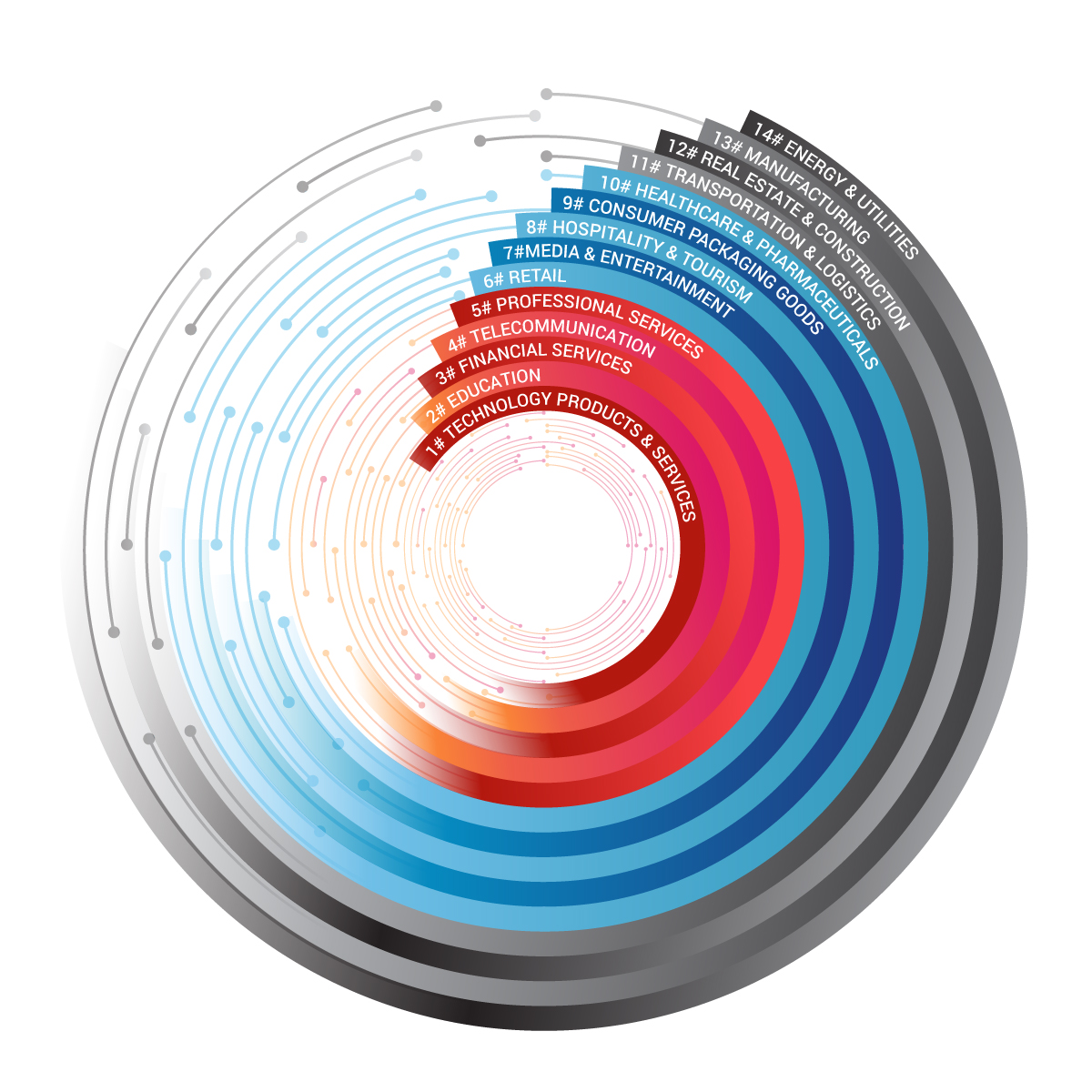
Digital Vortex 2023 report
IMD’s Global Center for Digital Business Transformation has recently published its biennial Digital Vortex research report, which identifies the sectors most susceptible to digital disruption and emphasizes that digital disruption is a universal phenomenon that affects all industries.
Through our research initiated in 2015, we observed varying degrees of digital disruption across industries, with some experiencing rapid and significant impacts while others were less immediately affected. We employed digital vortex to illustrate such phenomenon, wherein industries are pulled towards the center in a chaotic manner.
Industries closest to the center of the digital vortex are the most vulnerable to digital disruption. In 2023, technology products and services, education, financial services, and telecommunications are the most susceptible industries (refer to Figure 1). These industries share common characteristics that make them vulnerable to digital disruption, such as their ability to digitize core offerings and services and their reliance on business-to-consumer (B2C) models. In contrast, business-to-business (B2B) industries on the periphery of the vortex are less affected by disruption but run the risk of being unexpectedly pulled into the center.
Figure 1 digital vortex 2023
Technology plays a crucial role in the disruption of industries, and technology products and services are once again the most vulnerable sector to digital disruption in 2023. The rise of generative artificial intelligence (AI) has contributed to this vulnerability, with applications that have the potential to transform various industries and domains. The pandemic has also accelerated disruptive forces in several sectors, with education entering the top-five for the first time since 2015. Digital technologies have enabled a broader spectrum of learners to access courses and have enhanced the overall learning experience. Emerging tools such as augmented and virtual reality (XR) have also been found to boost learning efficiency.
The distance of an industry from the center of the digital vortex does not indicate the level of disruption it has experienced. Rather, it reflects the extent to which an industry has been affected by digital technology relative to others. For example, the media and entertainment sector has moved from being the most vulnerable to digital disruption in 2017 to seventh place in 2023. Similarly, the retail sector has gone from fourth to sixth place in the same period.
This does not mean that these industries are immune to disruption, but rather that transformation is ongoing. New technologies such as artificial intelligence, cloud computing, big data analysis, and social commerce have created new challenges and opportunities for retail companies. Industries are also blurring together to create “hybrid industries.” Retail-tainment, for instance, combines entertainment and retail to provide a more engaging customer experience.
Digital disruption and transformation are continuous processes that are impacting all industries, but the degree and speed of change may differ based on various factors such as industry, technology adoption, and government policies. Are you interested in learning about how these factors are impacting the situation both on a global scale and specifically within the Taiwanese market?
“While the majority of business leaders are aware of digital disruption and its potential effects, up to 72% of Taiwanese and 64% of global companies stated that they were either doing nothing or were unsure of what to do. There is clearly still a big knowing-doing gap with regards to the challenges posed by digital disruption.”
Read the full report in English here
If you are interested to read the full report in Chinese, please visit here
Research Information & Knowledge Hub for additional information on IMD publications
The increasing datafication of the workplace is often cast as a means of imposing organisational and managerial control on workers. This reflection...
Few Business to Business (B2B) marketplaces have succeeded. Metalshub has successfully combined a software platform as a service, with a marketplac...
The case focuses on Contabilizei, a Brazilian startup providing online accounting services for small and medium-sized enterprises (SMEs). The case ...
Technology and digital media allow information to continuously cascade through our lives, so it is no wonder that many of us can miss tiny data poi...
As of 7 March 2024, the EU Commission began to enforce its controversial Digital Markets Act (DMA). This article sheds light on the recent debate. ...
Research Information & Knowledge Hub for additional information on IMD publications
in Scandinavian Journal of Information Systems July 2024, vol. 36, no. 1, article 2
Research Information & Knowledge Hub for additional information on IMD publications
in I by IMD 27 June 2024
Research Information & Knowledge Hub for additional information on IMD publications
Research Information & Knowledge Hub for additional information on IMD publications
in I by IMD Magazine June 2024, no. 14, pp. 48-53
Research Information & Knowledge Hub for additional information on IMD publications
Case reference: IMD-7-2457 ©2024
Research Information & Knowledge Hub for additional information on IMD publications
Case reference: IMD-7-2546 ©2024
Research Information & Knowledge Hub for additional information on IMD publications
in I by IMD 13 June 2024
Research Information & Knowledge Hub for additional information on IMD publications
Research Information & Knowledge Hub for additional information on IMD publications
in Intereconomics May-June 2024, vol. 59, no. 3, pp. 154-159, https://doi.org/10.2478/ie-2024-0032
Research Information & Knowledge Hub for additional information on IMD publications





